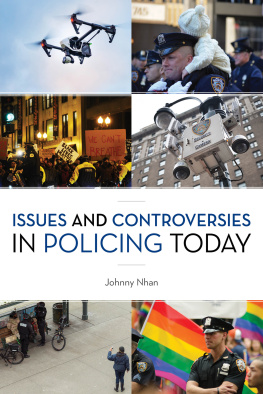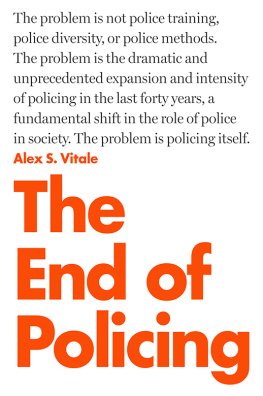
Introduction to Policing Research
The expansion of degrees and postgraduate qualifications in policing has come hand-in-hand with the need for a more scholarly and research-based approach to the subject. Students are increasingly encouraged to apply research to practice and this book is specifically designed to bring clarity to the concept of empirical research in policing.
As an introduction to the theoretical explanations and assumptions that underpin the rationale of research design in policing, this book clearly illustrates the practical and ethical issues facing empirical research in a policing context, as well as the limitations of such research. Introduction to Policing Research brings together a range of leading scholars who have a wide range of experience conducting police research. Topics covered include:
professional development
police culture
policing protests
private policing
policing and diversity
policing in transition
policing and mental health
policing and sensitive issues.
This book is perfect for undergraduate and graduate students on policing degrees, as well as graduate students and researchers engaged with criminal justice. It is also essential reading for police officers taking professional and academic qualifications.
Mark Brunger received his PhD from Queens University Belfast in 2010 and was a Senior Lecturer in Policing Studies at Canterbury Christ Church University, UK. He published on issues of neighbourhood and community policing, covering both the UK and Northern Ireland in journals such as: The International Journal of Semiotics of Law, Criminal Justice Matters, Crime Prevention and Community Safety, Crime, Law and Social Change and Fortnight. He was a key contributor to the teaching of modules on the BSc (Hons) degree in Policing and Police Studies (pre-service), aimed at students intending to pursue a career in policing. His expertise and research interests lay in police accountability, police professionalisation, the use of multiagency partnerships and the application of ethnographic research methods.
Stephen Tong is Director of Policing and Criminal Justice at Canterbury Christ Church University, UK. He has contributed to the development of the policing curriculum at the university at undergraduate and postgraduate level over the past thirteen years. He contributed to the Independent Stevens Commission on the future of policing (2013), the Blackstones Handbook for Policing Students (an annual publication) and articles on various policing issues. His research interests include: investigative practice, police cooperation and leadership, professionalisation, police training and education.
Denise Martin is a Senior Lecturer in Criminal Justice and Criminology at the University of the West of Scotland, UK. She completed her PhD research on Best Value Policing at Middlesex University in 2004. Denise has conducted research on a range of topics within both the prison and the police service. Denise is a member of the Scottish Institute of Policing Research.
Introduction to Policing Research
Taking lessons from practice
Edited by
Mark Brunger,
Stephen Tong and
Denise Martin
First published 2016
by Routledge
2 Park Square, Milton Park, Abingdon, Oxon, OX14 4RN
and by Routledge
711 Third Avenue, New York, NY 10017
Routledge is an imprint of the Taylor and Francis Group, an informa business
2016 selection and editorial material, M. Brunger, S. Tong and D. Martin; individual chapters, the contributors.
The right of Mark Brunger, Stephen Tong and Denise Martin to be identified as authors of this work has been asserted by them in accordance with sections 77 and 78 of the Copyright, Designs and Patents Act 1988.
All rights reserved. No part of this book may be reprinted or reproduced or utilised in any form or by any electronic, mechanical, or other means, now known or hereafter invented, including photocopying and recording, or in any information storage or retrieval system, without permission in writing from the publishers.
British Library Cataloguing in Publication Data
A catalogue record for this book is available from the British Library
Library of Congress Cataloging-in-Publication Data
Introduction to policing research: taking lessons from practice/edited by M. Brunger, S. Tong and D. Martin. First Edition.
pages cm
1. Police Research. I. Brunger, Mark, editor.
HV7935.158 2016
363.23072 dc23
2015021334
ISBN13: 978-0-415-75040-0 (hbk)
ISBN13: 978-1-138-01329-2 (pbk)
ISBN13: 978-1-315-79529-4 (ebk)
Typeset in Bembo and Gill Sans
by Florence Production Ltd, Stoodleigh, Devon, UK
Dedication to Dr Mark D. Brunger
This book is dedicated to a man who always described himself as a critical friend to the police. A man who spoke to numerous practitioners, scholars and students of policing during his lifetime in the quest to right wrongs and do this in a meaningful way that would contribute towards building a fair and just society. That man is Dr Mark D. Brunger, a passionate researcher, inspirational teacher and dedicated scholar in the field of criminology and policing. The contents of this book not only reflect his interests in policing research but also the collegiate research environment within the corridors of Canterbury Christ Church University where the idea of this book was conceived. I remember Mark talking on the numerous occasions of discussions and debates over coffee, breakfast and lunch meetings and down the pub with colleagues such as Steve Tong, Bob Underwood, Bryn Caless, Paul Gilbert and Kristina Massey, to name a few, at Canterbury Christ Church University. I want to take this opportunity to thank them personally for their support for and of Mark. I know just how much he is missed, not only as a member of the team, but also as a close colleague and friend. I want to express particular thanks to them, and also to many of Marks former students for the wonderful and generous messages and shared memories of Mark as a magnificent teacher and mentor. I am honoured to write this dedication in memory of Mark and will end by sharing a story from the great man himself. As a little boy, Mark always said that he wanted to be a policeman. Yet life has a strange way of throwing experiences at you that you least expect, and the world of academia is where he found his true calling in life and was able to flourish and quench his insatiable thirst for knowledge. Mark always believed that knowledge itself is power and inspired those around him to persevere to success. Everyone who was lucky enough to have spent time with Mark knew of his warmth, charm, humour and enthusiasm. While he is greatly missed by all that knew him, the pages of this book reflect the passion for research in the field of policing that was the fuel for his intellectual curiosity. I have no doubt that he would be proud of the final product. A particular quote from the English writer Samuel Johnson comes to mind when I think of my darling husband, curiosity is, in great and generous minds, the first passion and the last. This book is in memory of one of those great and generous minds.
Mark, my love, this book is for you.





